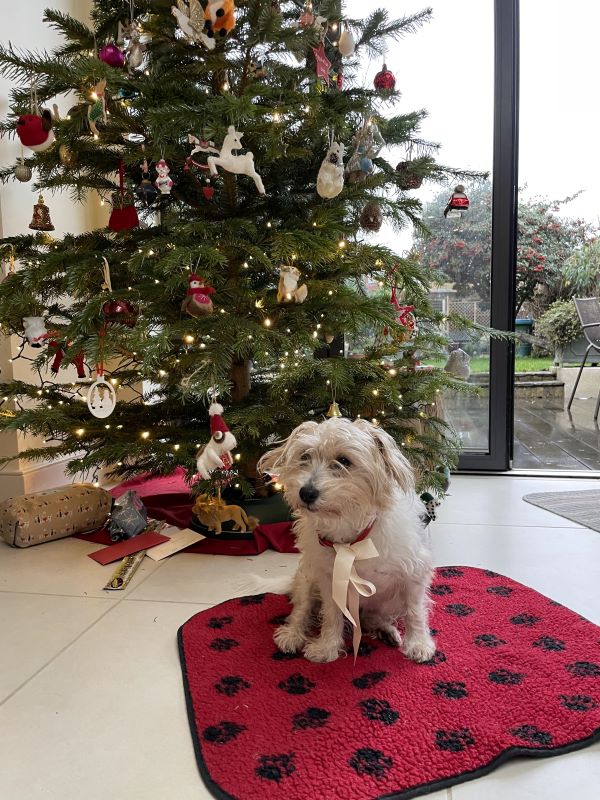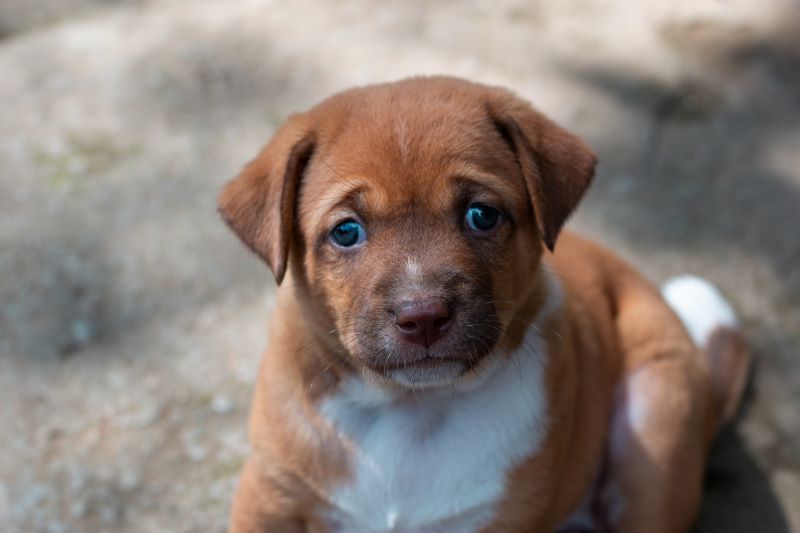New research reveals biggest risk factors for puppies developing separation-related behaviours
New research conducted by the Royal Veterinary College (RVC), in collaboration with Dogs Trust, has identified experiences in a puppy’s early life that put them at the greatest risk of developing separation-related behaviours (SRBs) when left home alone. These include how much sleep a puppy receives and if they sleep in an enclosed space, the use of reward and aversive training techniques, the effectiveness of house training, the age of owners and how much owners fussed over their dog when reunited, in the first study of its kind.

Canine SRBs are of concern because they can be associated with poor animal welfare. SRBs often manifest when an owner is absent and include destructive behaviour such as chewing and scratching; vocal behaviours such as barking, howling and whining; defecation or urination in the home; and repetitive behaviours such as spinning or pacing.
Despite these behaviours being identified in approximately 50% of dogs, the factors that lead to SRBs in puppies are poorly understood, making them difficult to prevent. Therefore, this study set out to explore early life risk factors for the development of SRBs with a view to making recommendations for future research and prevention strategies to improve dog welfare.
The study was led by Dr Fiona Dale, when a PhD student at the RVC, alongside Dr Charlotte Burn, Associate Professor in Animal Welfare and Behaviour Science at the RVC, and Dogs Trust’s Dr Rachel Casey, Director of Strategy and Transformation, and Dr Jane Murray, Deputy Head of Research (Generation Pup & Welfare Research).
The study was conducted using data from 145 owners living in the UK and the Republic of Ireland with puppies up to six months of age who were participating in the Dogs Trust-funded longitudinal study ‘Generation Pup’.
Researchers carried out an exploratory risk factor analysis to investigate and quantify associations between dog and owner factors and specific environmental experiences in early life, and their effect on owner-reported SRB occurrence in six-month-old puppies.
The key findings included that:
- 46.9% of puppies in this study displayed SRBs at six months of age.
- The most commonly reported SRB expressed only when left alone was pacing (14.5%), followed by whining (7.6%) and spinning (6.9%).
- Puppies whose owners used more punishment/aversive techniques, such as telling off, smacking, or ignoring the dog, when responding to ‘bad’ behaviour at 16 weeks of age had an increased risk of SRBs at six months.
- Puppies whose owners reported ‘fussing’ over their dogs at six months in response to ‘bad’ behaviour upon their return, versus those whose owners responded in other ways, were six times more likely to display SRBs at six months of age.
- Dogs were less likely to develop SRBs if owners reported that, at less than 16 weeks old, puppies were restricted to crates/rooms overnight, compared with puppies who were not restricted in this way (daytime or overnight).
- Dogs whose owners reported that they had 9 or more hours of sleep per night (when aged 16 weeks or less) were less likely to develop SRBs than dogs reported to have 6-8 hours of sleep at night.
- Puppies with poor house training at less than 16 weeks were more likely to show SRBs at six months of age.
- Puppies trained using kibble (other than their normal dog food) and/or dog treats were more likely to develop SRBs, compared to dogs trained without these types of reward.
- Dogs belonging to younger owners (aged 16 to 34 years) had an increased risk of developing SRBs compared to owners aged 35 years and older.
- Other factors that were explored, including dog breed and sex, showed no significant association with SRB occurrence.
The study concluded that SRB development in dogs could therefore potentially be prevented by refraining from aversive training of puppies, enabling puppies to sleep for 9 or more hours a night in a crate or restricted to a room, and avoiding fussing over puppies in response to unwanted behaviour following separation. However, further research is now required to determine to what extent these factors play a role in causing dogs to develop SRBs, compared to being a symptom of them or other alternative explanations for the findings.
If any owner is concerned about their dog’s behaviour, they should contact their veterinary surgeon and/or an accredited animal behaviourist. Dogs Trust also offers a free, behaviour support line for owners seeking advice or help with more details on their website (https://www.dogstrust.org.uk/how-we-help/ownership/behaviour-support-line).

Fiona Dale, PhD student at the RVC, said:
“Separation-related behaviours are often viewed as being a normal part of having a dog. However, dogs becoming extremely distressed when left home alone and barking, howling, or destroying furniture every day is heartbreaking.
“There has been relatively little research to date into whether the early experiences of puppies influence if they develop SRBs later in their lives. Our findings suggested that how owners responded to their puppies’ behaviour across different contexts was associated with the development of SRBs. In particular, aversive techniques (e.g. shouting at the puppy) when responding to ‘bad’ behaviour and fussing during reunions may lead to an increased risk of SRBs when puppies are six months of age.
“These results require further research but are exciting and may contribute to improving dog welfare by bringing about positive change regarding how owners approach responding to puppy ‘problem behaviours’.”
Dr Charlotte Burn, Associate Professor in Animal Welfare and Behaviour Science at the RVC, said:
“Dogs can become highly stressed when left alone, so any evidence suggesting how to help puppies learn to relax during separation is much needed. For me, the finding that stands out most is that punishing or ignoring puppies is associated with more separation-related behaviour when they are older. This ties in with other evidence showing that punishment seems to make dogs more anxious in general. Learning to use rewards and praise in consistent and thoughtful ways, might really help puppies to become calmer and more resilient to all sorts of challenges, including being left alone.”
Jane Murray, Deputy Head of Research (Generation Pup & Welfare Grants), at Dogs Trust, said:
“Separation-related behaviour can have serious welfare implications for dogs and be very problematic for owners. Data from Dogs Trust’s Generation Pup study provides the ideal opportunity to increase our knowledge of factors that might increase the likelihood of these behaviours developing. Further work will enable us to work towards strategies and advice to reduce the likelihood of separation-related behaviours developing in dogs in the future.”
This research was funded by Dogs Trust.
Notes to Editors
Reference
Dale FC, Burn CC, Murray J and Casey R (2024). Canine separation-related behaviour at six months of age: Dog, owner and early-life risk factors identified using the ‘Generation Pup’ longitudinal study. Animal Welfare https://doi.org/10.1017/awf.2024.56
DOI: https://doi.org/10.1017/awf.2024.56
The Animal Welfare Science and Ethics group at the RVC undertakes research and teaching in the fields of animal welfare, animal behaviour and veterinary ethics and law.
Media contacts
- Jasmin De Vivo – devivo@plmr.co.uk jasmin.devivo@plmr.co.uk or rvc@plmr.co.uk
- Press Line: 0800 368 9520
Generation Pup
Generation Pup is the first study to follow dogs of all breeds throughout their lives. Owners of all UK and Republic of Ireland puppies under 16 weeks of age, of any breed or cross breed, can sign up and become part of the Generation Pup community.
By collecting information about each puppy – their environment, family, health, behaviour and experiences – we can build up a picture of a whole generation of dogs across the UK and Republic of Ireland. This means that researchers in the Generation Pup team can investigate whether aspects such as environment, social interaction, diet, exercise or daily routine may be important in the development of a range of health and behaviour conditions which impact on the well-being of our dogs. (https://generationpup.ac.uk/).
About the RVC
- The Royal Veterinary College (RVC) is the UK's largest and longest established independent veterinary school and is a Member Institution of the University of London.
- It is one of the few veterinary schools in the world that hold accreditations from the RCVS in the UK (with associated recognition from the AVBC for Australasia, the VCI for Ireland and the SAVC for South Africa), the EAEVE in the EU, and the AVMA in the USA and Canada.
- The RVC is ranked as the top veterinary school in the world in the QS World University Rankings by subject, 2024.
- The RVC offers undergraduate and postgraduate programmes in veterinary medicine, veterinary nursing and biological sciences.
- The RVC is a research-led institution, with 88% of its research rated as internationally excellent or world class in the Research Excellence Framework 2021.
- The RVC provides animal owners and the veterinary profession with access to expert veterinary care and advice through its teaching hospitals and first opinion practices in London and Hertfordshire.
About Dogs Trust
Dogs Trust is the UK’s largest dog welfare charity and cares for around 13,000 dogs every year across its network of 21 rehoming centres in the UK and one in Dublin. Dogs Trust has a non-destruction policy and will never put a healthy dog to sleep. The charity also focuses its efforts on understanding dogs and sharing that knowledge with the wider public to prevent problem behaviours that can result in relinquishment or abandonment. We are working towards the day when all dogs can enjoy a happy life, free from the threat of unnecessary destruction.
